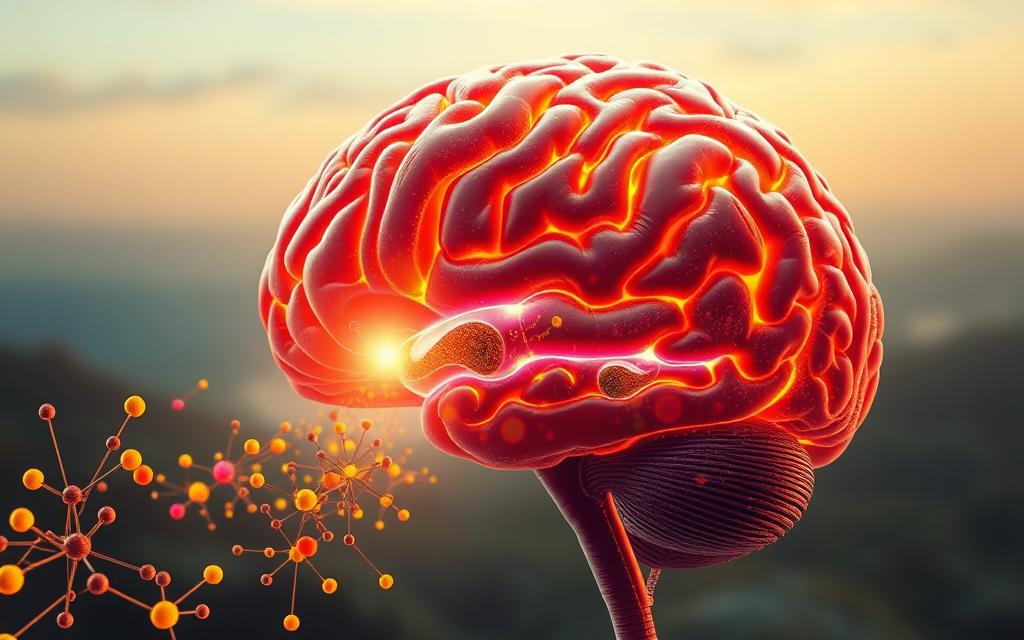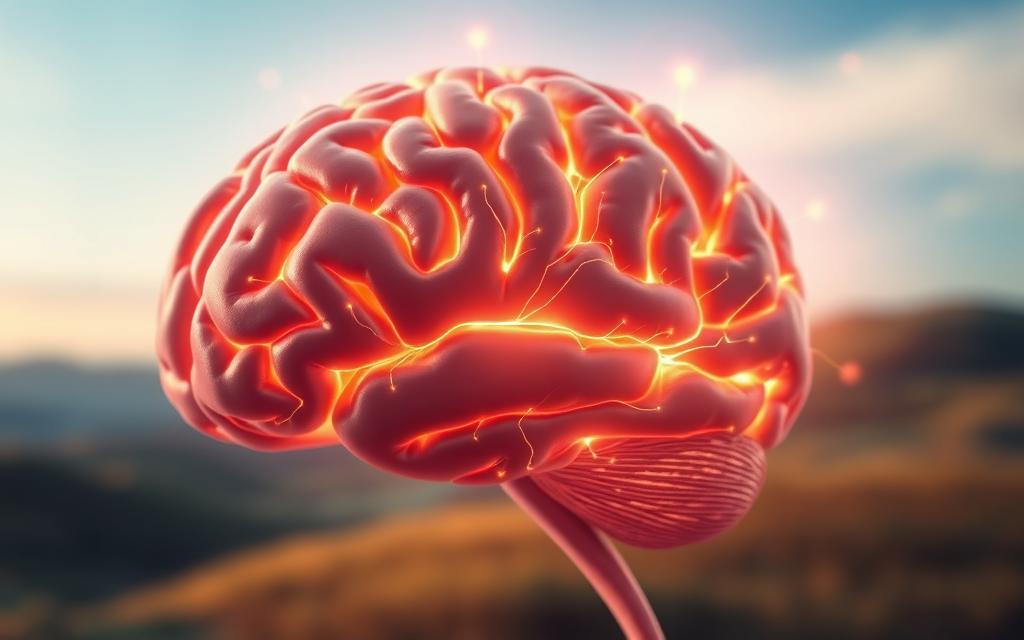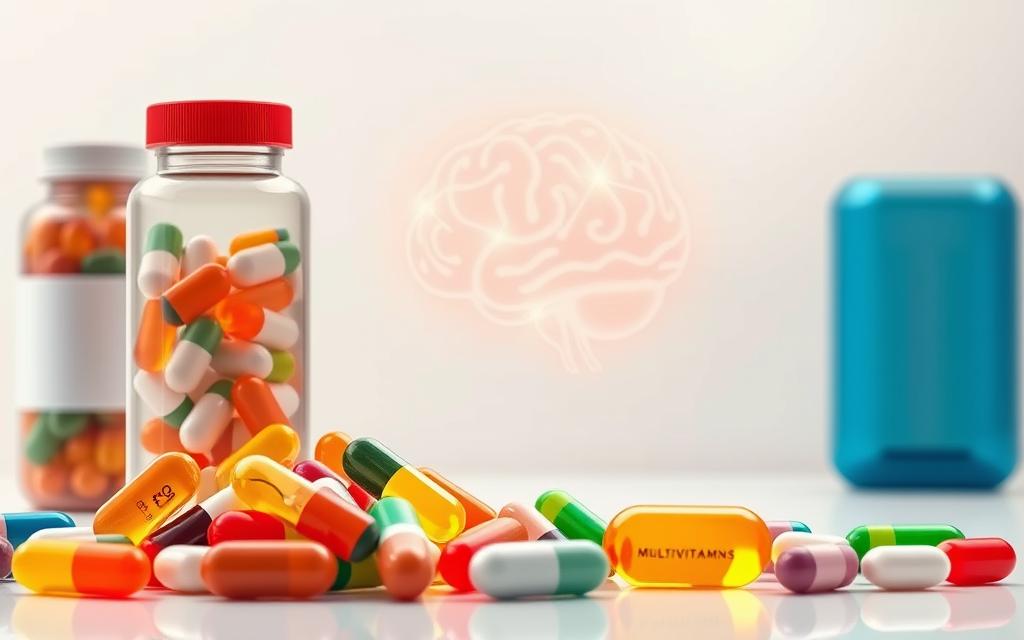As we get older, our brains can start to slow down. This makes it important to find ways to keep our minds sharp. Taking multivitamins is one way to help, as they can prevent memory loss and improve brain function.
Recent studies show that multivitamins are very helpful, mainly for people over 60. They found that taking a daily multivitamin can make your brain work like it’s two years younger than it would without it. This article will look at the vitamins and nutrients that are good for your brain. We’ll also talk about the best multivitamins and how they can help fight memory loss.
Key Takeaways
- Multivitamins may significantly contribute to preventing memory loss and enhancing cognitive health.
- Studies indicate that older adults may benefit from multivitamin supplementation, with observable cognitive improvements.
- The daily intake of multivitamins can effectively slow cognitive aging.
- Specific vitamins play essential roles in brain health, including Vitamins B12, D, and E.
- Ongoing clinical research continues to support the use of multivitamins for cognitive function enhancement.
Understanding Memory Loss and Its Causes
Memory loss can show up in many ways, from simple forgetfulness to serious brain problems. As people get older, they often experience memory loss. Diseases like dementia, including Alzheimer’s, can really mess with how our brains work.
Not getting enough vitamins like B12, A, and E can hurt our brain health. Eating well is key to keeping our brains sharp. Stress, bad eating habits, and feeling lonely can also affect our memory.
It’s important to understand why memory loss happens. Taking care of our health and eating right can help fight brain problems. By being proactive, we can keep our memories strong as we age.
How Nutrients Affect Cognitive Function
Nutrients are key to keeping our brains sharp and healthy. Vitamins and minerals help our brains work at their best. If we don’t get enough, our thinking skills can start to slip.
Antioxidants like vitamins C and E are good for our brains. They might even help a bit with thinking and memory. But, the science is still growing.
Fatty acids, like those in fish and flaxseeds, are also important. They support brain health and thinking skills. Adding these to your diet can boost your mental sharpness.
To keep our brains in top shape, we need a variety of nutrients. Eating foods rich in vitamins, minerals, antioxidants, and healthy fats is essential. It helps our brains stay healthy and sharp as we get older.

The Role of Vitamins in Brain Health
Vitamins are key to keeping our brains healthy and sharp. Studies show that vitamins B-complex, C, D, and E help with memory and mental clarity. They help brain cells talk to each other by making important chemicals.
Research shows that taking multivitamins daily can slow down brain aging by about two years. Older adults who took multivitamins did better in memory and thinking. They saw big improvements in just one year, showing how important vitamins are for our brains.
For our brains to work best, we need the right mix of vitamins. Experts say we should take products with at least 20 nutrients. While many people take supplements, not all are tested well for memory help.

Getting enough vitamins is linked to better memory and thinking. This shows how important good nutrition is for our brains as we get older. People with heart disease might get even more benefits from vitamins because they might need more. So, focusing on vitamins is a smart way to keep our minds sharp.
Vitamin B12 and Memory Preservation
Vitamin B12 is key for keeping our memory sharp and our brains healthy. It helps make red blood cells and keeps our nerve cells in top shape. Eating foods rich in Vitamin B12 is essential for our brain’s performance.
Sources of Vitamin B12
Eating enough Vitamin B12 can fight off memory loss. Here are some natural sources:
- Fish, such as salmon and trout
- Poultry, like chicken and turkey
- Meat, including beef and lamb
- Dairy products like milk, yogurt, and cheese
- Fortified cereals, which are a big source of this vitamin
These foods are crucial for older adults. Studies show that over 20% of people over 65 have a Vitamin B12 deficiency. This can cause memory problems.
Consequences of Vitamin B12 Deficiency
Not getting enough Vitamin B12 can harm our brains. It can cause memory loss and make us feel confused. If not treated, these problems can last forever.
Also, many people in the U.S. have stomach problems. These can make it harder to get enough Vitamin B12. For older people, getting enough Vitamin B12 is very important. It helps keep their brains working well.

Vitamin D’s Impact on Cognitive Function
Recent studies show Vitamin D’s big role in improving brain function and memory. Over 65% of older adults lack enough Vitamin D, known as 25(OH)D. This lack harms their brain skills, like solving problems and remembering things.
Research links Vitamin D levels to better brain test scores. People with more than 20 ng/mL of 25(OH)D do better in brain tasks. Studies show small Vitamin D increases can boost memory and focus.
It’s key to keep Vitamin D levels up for brain health. Sunlight and foods like fatty fish help. Without enough, brain skills can decline. So, keeping Vitamin D levels right is crucial for sharp thinking and memory.

Vitamin E and its Potential Benefits for Memory
There’s growing interest in Vitamin E for brain health, focusing on its memory benefits. Studies suggest Vitamin E might slow down brain decline, which is crucial for older adults. This group is at higher risk of dementia and mild cognitive impairment (MCI). While early results are encouraging, more research is needed to fully understand its effects.
Natural Sources of Vitamin E
Eating foods rich in Vitamin E can help your memory. Here are some good options:
- Nuts, such as almonds and hazelnuts
- Seeds, like sunflower seeds
- Green leafy vegetables, including spinach and kale
- Vegetable oils, like wheat germ oil and sunflower oil
- Fortified cereals and other fortified foods

These foods not only boost Vitamin E levels but also offer other nutrients good for the brain. Adding a mix of these to your diet can help protect your memory as you get older.
Omega-3 Fatty Acids: A Key Nutrient
Omega-3 fatty acids are key for brain health and better thinking. They are in many foods, helping with memory and mental focus. Knowing how important Omega-3 is helps keep our brains working well.
Foods Rich in Omega-3
To get more Omega-3, eat foods full of it. Good choices are:
- Salmon
- Walnuts
- Flaxseeds
- Chia seeds
- Hemp seeds
Eating these foods often helps keep your memory sharp.
Research Findings on Omega-3 and Memory
Many studies show Omega-3’s good effects on memory and brain health. People who eat Omega-3s often have less brain decline. Studies also link more Omega-3 to less risk of mental problems as we age.

Multivitamins and Their Efficacy in Preventing Memory Decline
Studies show that multivitamins might help fight memory loss. They have key ingredients that boost brain function. For older adults, they slow down brain aging, which is good news for memory and brain health.
Overview of Key Ingredients in Multivitamins
Multivitamins, like Centrum Silver, have 24 vitamins and minerals. These help keep the brain healthy. Vitamins B12, D, and E are important for memory and brain work.
Clinical Studies Supporting Multivitamin Use
Research backs up the benefits of multivitamins for the brain. The COSMOS study with over 3,500 adults found they did better in memory tests. They seemed to slow down memory loss by two years.
People with heart problems saw the biggest gains. This supports the idea that multivitamins can help as we age.

Best Multivitamins for Memory Support
Looking for the best multivitamins for memory support is key for older adults. A study in the American Journal of Clinical Nutrition found that Centrum Silver improved cognitive skills. This shows that the right multivitamins can boost memory.
It’s important to pick multivitamins based on their nutrients. Vitamin B12 is crucial for brain health, as 6% of older adults lack it. The National Institutes of Health says a good multivitamin can fill common gaps, helping those at risk.
Nature Made® Men’s and Women’s Multivitamin 50+ Tablets have important nutrients like Iodine and Zinc. The FDA also suggests eating fish for brain health. Taking 250 mg of DHA daily can help the brain.
Choosing the right multivitamin means talking to a healthcare professional. They can make sure it fits your health needs. Most people can safely take multivitamins every day. But, it’s important to use them wisely and not overdo it, to avoid harm.
Multivitamins for Women and Their Role in Cognitive Health
Multivitamins for women are packed with nutrients that meet their unique health needs. They are key for cognitive health. As women go through different life stages, their nutritional needs change. This makes certain vitamins crucial for better memory.
Research shows that some vitamin deficiencies can harm cognitive health. Studies found that taking multivitamins can improve memory and brain functions. They can also help slow down memory loss as women get older.
Women’s multivitamins often have B vitamins, omega-3 fatty acids, and vitamin D. These are important for brain health. As women age, getting enough of these nutrients becomes more important for their mental sharpness and memory.
More women are realizing how their multivitamin choices affect their brain health. Multivitamins made for women aim to boost memory and brain function. For those worried about losing mental sharpness, taking multivitamins can be a smart move.
Multivitamins for Men: Enhancing Brain Function
As men get older, keeping their minds sharp is key. Multivitamins can help a lot with this. They have important nutrients that boost brain health, helping men stay alert and focused.
NeuroVite Plus is a great example. It has over 50 nutrients and plant extracts in their best forms. It has more than 1000% of some nutrients than the FDA suggests. It aims to help men reach their best brain health.
Studies show that certain ingredients in multivitamins are good for the brain. Alpha-Lipoic Acid (ALA) helps nerve cells, and PhosphatidylSerine (PS) is good for the brain, as the FDA says. These can make mental tasks easier, even for older adults.
It’s important to take multivitamins every day. Men should take them regularly for their brain health. For example, adults and teens might take four NeuroVite Plus capsules a day. This gives them all the nutrients they need for their brain.
What men put in their daily routine matters a lot for their brain health. Having enough vitamins and minerals, along with a healthy lifestyle, can improve brain function and memory. This supports their mental health over time.
Conventional vs. Natural Methods to Improve Memory
Many people want to improve their memory. They look into both conventional and natural methods. Conventional methods include using supplements and medications to boost memory. These can help but may have side effects and need to be taken regularly.
Natural methods focus on lifestyle changes and diet. Eating foods full of vitamins and omega-3 fatty acids is key for brain health. Studies show that certain diets can greatly improve memory. For example, older adults taking multivitamins like Centrum Silver saw better memory after a year compared to those not taking them.
Both conventional and natural methods have their benefits. The right choice depends on personal preferences and health needs. Knowing the strengths of each helps people make better decisions for their brain health.
Lifestyle Changes to Support Cognitive Health
Making lifestyle changes is key to keeping your brain sharp. Eating a healthy diet, like the Mediterranean one, is a good start. It includes lots of fruits, veggies, whole grains, lean meats, and low-fat dairy. This diet helps prevent heart disease and diabetes, which can harm your brain.
Exercise is also vital. The government says you should move for at least 150 minutes a week. This keeps your body and mind healthy. Studies show that exercise makes your brain better at remembering things and learning new stuff.
Doing mental exercises and staying social are important too. Activities like crossword puzzles and games keep your brain active. Being around people, like volunteering or visiting friends, also helps your brain stay sharp as you get older.
Don’t forget about sleep and managing stress. Not getting enough sleep and too much stress can hurt your brain. Simple changes in your daily life can make a big difference in how well you think.
Engagement in Community and Social Activities
Being active in community engagement and social activities is key for better cognitive health. It helps keep our minds sharp by offering emotional support and a sense of belonging. Group activities also challenge our minds, making them a great way to stay mentally fit.
Research shows that staying connected with others can improve memory and keep our minds sharp for longer. Activities like community events or group classes help us learn and stay mentally agile. They also help us form strong bonds, which are crucial for our emotional well-being.
Adding community engagement to our lives can greatly benefit our minds. For example, volunteering keeps our minds active and gives us a sense of purpose. Talking and discussing in groups also boosts our critical thinking and memory.
Conclusion
The role of multivitamins in memory support is getting more attention. About 50% of American adults take multivitamins regularly. But, research shows they don’t greatly help prevent memory loss.
Even though many people take them, studies say multivitamins don’t lower the risk of memory problems. This makes it clear that other things also matter for our brain health.
For some, taking multivitamins might help, like if they’re missing certain nutrients. But, the big spending on supplements shows we want to keep our brains sharp. It’s key to make healthy lifestyle choices too, for the best results.
Always talk to a doctor before starting any new supplements. They can suggest what’s best for you, based on your health. Using both supplements and healthy habits can really help our brains stay sharp.
FAQ
What are multivitamins and how do they help prevent memory loss?
Multivitamins are supplements with vitamins, minerals, and nutrients. They help keep the body healthy by providing essential nutrients. This supports brain health and prevents memory loss.
What specific vitamins are important for cognitive function?
Vitamins B-complex, C, D, and E are key for the brain. They help make neurotransmitters and keep the brain healthy. This improves mental clarity.
How does Vitamin B12 contribute to memory preservation?
Vitamin B12 is vital for the brain and memory. It helps make myelin, which protects nerves and boosts brain communication. Without enough, memory problems can occur, mainly in older adults.
What are the natural sources of Vitamin D?
Vitamin D comes from sunlight, fatty fish, and fortified foods. It’s also in supplements. It’s linked to better brain function and fighting diseases.
How does Vitamin E benefit memory and cognitive health?
Vitamin E protects brain cells from damage. It’s good for memory and brain health, mainly in older people. More research is needed to fully understand its benefits.
What role do Omega-3 fatty acids play in brain health?
Omega-3s are crucial for brain health. They help brain cells work better. They improve learning and memory and may slow cognitive decline.
Are all multivitamins equally effective in preventing memory decline?
No, not all multivitamins are the same. Their effectiveness depends on the vitamins and minerals they contain. Look for products with key ingredients for brain health.
What are the best multivitamins available for memory support?
The best multivitamins have a mix of vitamins and minerals for the brain. Look for ones with B vitamins, vitamin E, and Omega-3s. Choose products tested by experts or recommended by health professionals.
Do men and women need different multivitamins for cognitive health?
Yes, men and women have different needs as they age. Multivitamins for each gender address their specific health needs. This supports cognitive health and memory.
Can lifestyle changes enhance the benefits of multivitamins?
Absolutely! Taking multivitamins is just part of the solution. Eating well, exercising, managing stress, and staying social also boost brain health and memory.
How can social engagement affect cognitive health?
Being social and active stimulates the brain. It improves mood and helps fight memory loss. Positive interactions and community involvement are key.
